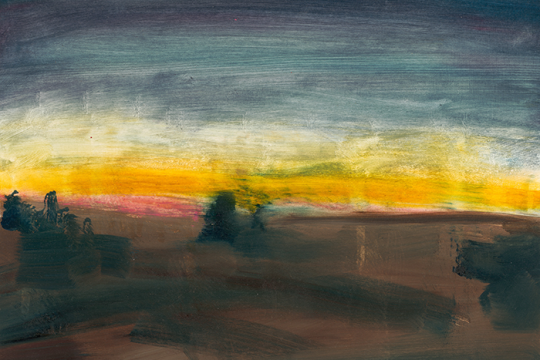
As I was recently watching my special edition DVD of the 1971 version of Fiddler on the Roof, I noticed something that seemed rather out of place: In the song "Tradition," when we are shown the inside of the synagogue, there are pictures representing the zodiac signs Scorpio and Libra (at 26 seconds into the song, to be precise). I found myself wondering what those depictions were doing in a synagogue, especially having been brought up to believe that astrology in all its forms was forbidden to Jews and Christians alike. Was this intentional, or a mistake on the part of the film makers who had attempted to portray Jewish life in early 20th century Russia? After doing some research, I found that it wasn't at all out of place for a synagogue to have depictions of the zodiac. In fact, such decorations can be found in ancient synagogues in Israel, with the oldest depictions dating back to the fourth century.
Judaism's relationship with astrology is one that has many twists and turns. Jewish interest in the zodiac can be traced back to the time of the Babylonian exile, which is evidenced by the fact that many of the Hebrew names of the constellations are actually Hebraicized versions of the original Assyrian names. For instance, both the Assyrian name (gisherin) and Hebrew name (moznayim) for the astrological sign Libra translate to "scales." There is speculation that some of the most prominent people in the Hebrew Bible were given the gift of astrology, including Abraham and King Solomon (Genesis 24:1, I Kings 5:10). Indeed, when Jethro gives Moses advice on leadership in Parashat Yitro, he suggests that Moses consult "anshei chayel," literally, strong people. Many understand this as a euphemism/reference to astrologers.
While the prophets derided astrology (especially in Isaiah 47:13 and Jeremiah 10:2), Josephus writes in the first century that consulting the stars was a common practice among Jews during his time. He even goes so far as to blame the failed revolt against the Romans and destruction of the Second Temple in 70 C.E. on Jewish astrologers who misinterpreted the stars.
We can see the practice of astrology becoming more accepted over time. Eventually, rabbis attempted to create parallels between the signs of the zodiac and tales from the Bible, which we can see in the seventh chapter of "Esther Rabbah." In that midrash, Aries represents the Passover sacrificial lamb; Taurus recalls Joseph, who was called "a bull"; Gemini represents the twins born to Judah and Tamar, Peretz and Zerah, and so on.
By the time of the Talmud, the rabbis took the fact that the stars influenced the lives of people for granted. At that point, their main debate focused on whether Jews were immune to the stars' influences. Rabbi Yohanan famously said, "Ein Mazal L'Yisrael," meaning, "there is no constellation for the people of Israel." However, Rabbi Hanina ben Hama held the opposite opinion, stating, "the stars make one wise, the stars make one rich, and there are stars for Israel" (Babylonian Talmud Shabbat 156a). Astrology continued to be appreciated as something of a science through the Middle Ages, with one notable voice of dissent.
One of the most famous medieval Jewish philosophers, Maimonides, is the only documented Jewish philosopher of his time who completely rejected astrology. Ironically, Maimonides's name itself is linked to astrology, as it's derived from the Arabic word maymūn, which means "luck" or "good fortune" and is connected to the stars. While other scholars were skeptical, they understood astrology as a science that could only go so far before running into the free will of humans, which had the power to negate personal horoscopes. The majority of later Jewish scholars shared the prevailing opinion of Maimonides's contemporaries, with only a couple opposing the practice. Indeed, there were several notable Jewish astrologers who were fixtures at the courts of European royalty and popes.
We are still familiar with one of these Jewish astrologers today: Nostradamus. While his family complied with the order of King Louis XII that all Jews in France be baptized as Christians, there is evidence that they became crypto-Jews who continued to practice Judaism in secret. Both of Nostradamus's grandfathers were court physicians who introduced him to the worlds of medicine, alchemy, and Kabbalah. Wealthy citizens sought him out to prepare their horoscopes, and he eventually became the favorite astrologer of the French queen, Catherine de Medici -- the granddaughter-in-law of Louis XII.
Today, astrology has become less prominent as a be-all-and-end-all in daily life. That said, it has seen a resurgence in popularity, especially among millennials like myself who enjoy checking our horoscopes and star charts just as much as we enjoy astrology memes on Facebook that tell us what kind of potato we are (as a Gemini, I am apparently a tater tot).
The stars' influence can still be felt even where we least expect it. For instance, many common Hebrew expressions having to do with luck mention the stars. Mazel tov, which loosely translates to "good luck" is actually a shortened version of the phrase siman tov u'mazal tov, which could more literally be translated as "[under] a good [zodiac] sign." The Yiddish word "schlimazel" is generally used to describe someone with bad luck, who was, to quote Beatrice from Shakespeare's Much Ado About Nothing, "born under a bad star." So, the next time you find yourself going stargazing, look up at the stars and think of how many generations before you did the same while seeking to unravel the mysteries of life and destiny.
Related Posts

Where Have All the Jewish Movies Gone?

Superman Can Inspire Us to be Jewish Heroes

